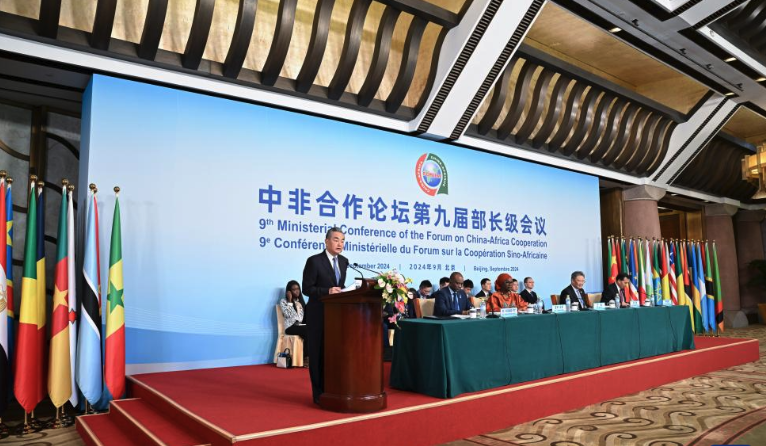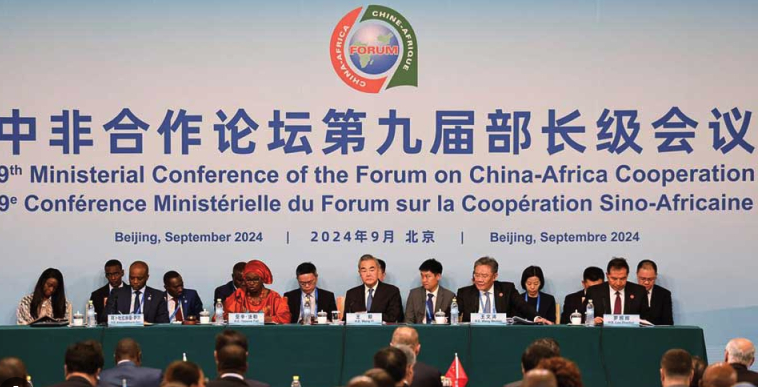In a momentous gathering at the Forum on China-Africa Cooperation (FOCAC), held on the vibrant stage of international diplomacy, President Bola Ahmed Tinubu of Nigeria commended the striking $280 billion expansion in economic and trade partnership between Africa and China. With a flair for the eloquent, Tinubu underscored not only the monumental economic leap but also the promise of a prosperous future that such collaboration heralds for both continents.
A Promising Partnership
Speaking at the opening ceremony, President Tinubu’s address was peppered with optimism and a clear-eyed view of future possibilities. The atmosphere in the grand auditorium was palpable with anticipation as Tinubu took to the podium.
“This substantial growth in our trade and economic ties with China,” he said with conviction, “is not just a figure; it is a testament to what can be achieved when nations come together with mutual respect, shared goals, and unyielding dedication.” His words resonated, reflecting the deep-seated aspirations of many in attendance.

The Numbers Speak
The $280 billion growth figure, indeed, has an unequivocally compelling story to tell. This number, representing the increased economic and trade volume between Africa and China, captures various facets of cooperation, ranging from infrastructure projects to direct investments.
Some key sectors that have seen remarkable advancements include:
- Infrastructure Development
- Energy and Power
- Telecommunications
- Agriculture
- Manufacturing
Each of these sectors benefits not merely from the inflow of capital but also from the transfer of technology and expertise, which has been a cornerstone of the Africa-China partnership.
Infrastructure Leap
Infrastructure development remains at the forefront of this burgeoning relationship. Chinese investments have spearheaded numerous projects across the continent, from the modernization of railways in East Africa to the construction of cutting-edge highways in West Africa.
“Our roads, bridges, and railways are not just symbols of modern engineering,” President Tinubu remarked, “they are pathways to economic vitality, reducing the distance between markets, bringing people closer, and enhancing the overall quality of life.” His assertion unveiled the deeper, human aspect of these grand constructions – how they weave together the fabric of opportunity.
Empowering Energy
Energy is another critical area where cooperation has flourished. Africa, long battling energy deficits, now enjoys several renewable energy projects funded and facilitated by Chinese counterparts. Solar farms, wind energy projects, and vast hydroelectric dams are being constructed with unprecedented vigour.
President Tinubu pointed out, “With each megawatt of power generated, we light up homes, power industries, and energize our aspirations for a sustainable future.” These advancements are not just feats of engineering but are seen as engines driving growth and development in real, tangible ways.

Agricultural Advancements
Agriculture, too, has been significantly impacted. The synergy between Chinese technology and African agricultural potential has led to robust productivity advances. From mechanized farming techniques to hybrid crop innovations, the sector is witnessing a transformation.
“With our fertile lands and China’s technological prowess,” President Tinubu elaborated, “we are not just feeding our nations; we are securing our food future.” His words drew applause, acknowledging the role agriculture plays in not just economic terms but also in ensuring food security for millions.
Manufacturing Milestones
Manufacturing, the backbone of industrial growth, has equally benefited. Joint ventures and collaborations have led to the establishment of several manufacturing hubs across the continent. These facilities are creating employment opportunities, fostering skill development, and nurturing a new generation of industrial artisans.
“Each factory, each assembly line is a testament to our shared ambition”, observed President Tinubu with evident pride. These manufacturing centres are not just units of production but symbols of a new industrial age dawning over the African continent.
A Vision for the Future
While President Tinubu’s accolades for the present achievements were abundant, he was not remiss in looking towards the future. “What we have achieved today is significant,” he said, “but it should be seen as the foundation upon which we will build an even more robust and comprehensive partnership.”
Tinubu outlined several avenues for future cooperation, emphasizing:
- Continued Technological Exchange
- Deepening of Cultural Ties
- Expansion into New Economic Sectors
- Joint Research and Development Initiatives
- Enhanced Bilateral Trade Agreements
The event concluded on a high note, brimming with optimism. The $280 billion trade and economic growth between Africa and China stands as a landmark achievement celebrated at FOCAC. But more importantly, it sets the stage for continued cooperation, heralding a future where African and Chinese dreams and destinies are increasingly intertwined.
President Tinubu’s words serve as both a tribute and an inspiration: “Our journey together is just beginning, and with every step, we deepen our friendship, broaden our horizons, and strengthen the bridges that connect us.”
A future ripe with promise and potential awaits, forging a path of mutual prosperity that sets a glittering example for the world.